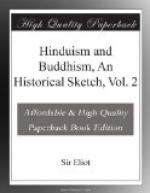Though Caitanya was not a writer himself he exercised a great influence on the literature of Bengal. In the opinion of so competent a judge as Dinesh Chandra Sen, Bengali was raised to the status of a literary language by the Vishnuite hymn-writers just as Pali was by the Buddhists. Such hymns were written before the time of Caitanya but after him they became extremely numerous[638] and their tone and style are said to change. The ecstasies and visions of which they tell are those described in his biographies and this emotional poetry has profoundly influenced all classes in Bengal. But there was and still is a considerable hostility between the Saktas and Vishnuites.
4
A form of Vishnuism, possessing a special local flavour, is connected with the Maratha country and with the names of Namdev, Tukaram[639] and Ramdas, the spiritual preceptor of Sivaji. The centre of this worship is the town of Pandharpur and I have not found it described as a branch of any of the four Vishnuite Churches: but the facts that Namdev wrote in Hindi as well as in Marathi, that many of his hymns are included in the Granth, and that his sentiments show affinities to the teaching of Nanak, suggest that he belonged to the school of Ramanand. There is however a difficulty about his date. Native tradition gives 1270 as the year of his birth but the language of his poems both in Marathi and Hindi is said to be too modern for this period and to indicate that he lived about 1400,[640] when he might easily have felt the influence of Ramanand, for he travelled in the north.
Most of his poetry however has for its centre the temple of Pandharpur where was worshipped a deity called Vitthala, Vittoba or Pandurang. It is said that the first two names are dialectic variations of Vishnu, but that Pandurang is an epithet of Siva.[641] There is no doubt that the deity of Pandharpur has for many centuries been identified with Krishna, who, as in Bengal, is god the lover of the soul. But the hymns of the Marathas are less sensuous and Krishna is coupled not with his mistress Radha, but with his wife Rukmini. In fact Rukminipati or husband of Rukmini is one of his commonest titles. Namdev’s opinions varied at different times and perhaps in different moods: like most religious poets he cannot be judged by logic or theology. Sometimes he inveighs against idolatry—understood as an attempt to limit God to an image—but in other verses he sings the praises of Pandurang, the local deity, as the lord and creator of all. His great message is that God—by whatever name he is called—is everywhere and accessible to all, accessible without ceremonial or philosophy. “Vows, fasts and austerities are not needful, nor need you go on pilgrimage. Be watchful in your heart and always sing the name of Hari. Yoga, sacrifices and renunciation are not needful. Love the feet of Hari. Neither need you contemplate the absolute. Hold fast to the love of Hari’s name. Says Nama, be steadfast in singing the name and then Hari will appear to you."[642]




